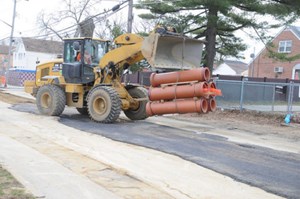Federal audit finds ‘a lot of work remains’ in Puerto Rico’s hurricane and earthquake recovery
SAN JUAN, Puerto Rico (AP) — Puerto Rico is trudging through reconstruction work after two devastating hurricanes and a string of strong earthquakes, and has spent less than 10% of more than $23 billion in available federal funds, according to a U.S. government report released Tuesday.
The U.S. territory has “a substantial amount” of permanent projects still pending as their costs soar and threaten to halt the rebuilding work, an audit by the U.S. Government Accountability Office found.
“More than six years after hurricanes Irma and Maria, Puerto Rico’s recovery is ongoing,” the report stated.
The GAO report also referred to a series of earthquakes that hit the island’s southern region in December 2019 and January 2020, causing millions of dollars in damage.
The report found that more than $11 billion of the $23.4 billion awarded by the U.S. Federal Emergency Management Agency following the hurricanes and earthquakes still requires the agency’s approval before Puerto Rico’s government can spend it.
It was not clear why the territory’s government has not yet taken the steps required to access the money. A spokesperson for Puerto Rico’s Office for Recovery, Reconstruction and Resiliency, which receives and awards federal grant funds, did not immediately return a message seeking comment.
However, documents show that Puerto Rico’s power company, Department of Education, and Aqueduct and Sewer Authority expect to submit applications to access the money by 2030 or later.
The federal funds are supposed to finance more than 9,300 permanent projects, with more than $13 billion slated for public utilities and $7 billion for public buildings and equipment.
However, rising costs have presented a challenge, according to the GAO audit that ran from November 2021 to February 2024.
The GAO noted that the cost of a water treatment plant exceeded its original estimate by more than 40%, while the cost of parts needed for a power plant rose from $9 million to $12 million.
The report said rising costs are of “particular concern” because of their cumulative impact.
“For example, officials from Puerto Rico’s Aqueduct and Sewer Authority said they anticipate that they will only be able to complete about half of the agency’s planned projects,” the report stated.
Contributing to the delays were interruptions in the global supply chain that increased the delivery time for construction materials needed by Puerto Rico’s power company from six months to up to three years, the audit found. Meanwhile, chronic power outages continue to plague the island.
Another challenge is a lack of workers ranging from architects to construction contractors, the report stated.
In an official response to the audit’s findings, Puerto Rico’s government requested more funding flexibility and noted that labor shortages in the local construction industry were a “significant factor” affecting recovery efforts.
The government also cited “significant reductions” in insurance coverage for several projects, as well as lengthy damage claim litigation between federal fund recipients and their private insurance companies.
“This limitation forces them to prioritize a select number of projects for development until insurance settlements are reached,” the government’s letter of response stated.
It also warned that when Hurricane Fiona hit Puerto Rico in September 2022, the storm caused additional damage that could not be distinguished from the damage wrought by Hurricane Maria in September 2017 because “several subprojects have not yet been formulated.”
Other challenges include an ongoing fiscal and economic crisis, with Puerto Rico recently emerging from the biggest U.S. municipal bankruptcy in history.
The GAO recommended that FEMA create a risk management plan, which it said the agency plans to do this month.
It also found that FEMA has successfully monitored Puerto Rico’s use of public funds via a review system, with the island improving its ability to manage such funds, at least from 2018 to 2020. Certain reviews of more recent years are pending.
Related News
From Archive

- Glenfarne Alaska LNG targets late-2026 construction start for 807-mile pipeline project
- U.S. water reuse boom to fuel $47 billion in infrastructure spending through 2035
- $2.3 billion approved to construct 236-mile Texas-to-Gulf gas pipeline
- Major water pipe break in Puerto Rico hits over 165,000 customers
- Potomac River Tunnel project enters construction phase beneath Washington, D.C.
- Pennsylvania American Water launches interactive map to identify, replace lead water service lines
- Trump's tariffs drive $33 million cost increase for Cincinnati sewer project
- Utah city launches historic $70 million tunnel project using box jacking under active rail line
- Tulsa residents warned after sewer lines damaged by boring work
- Fatal trench collapse halts sewer construction in Massachusetts; two workers hospitalized




Comments